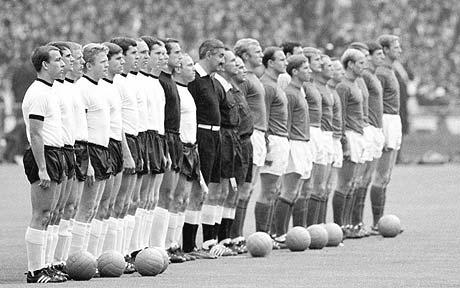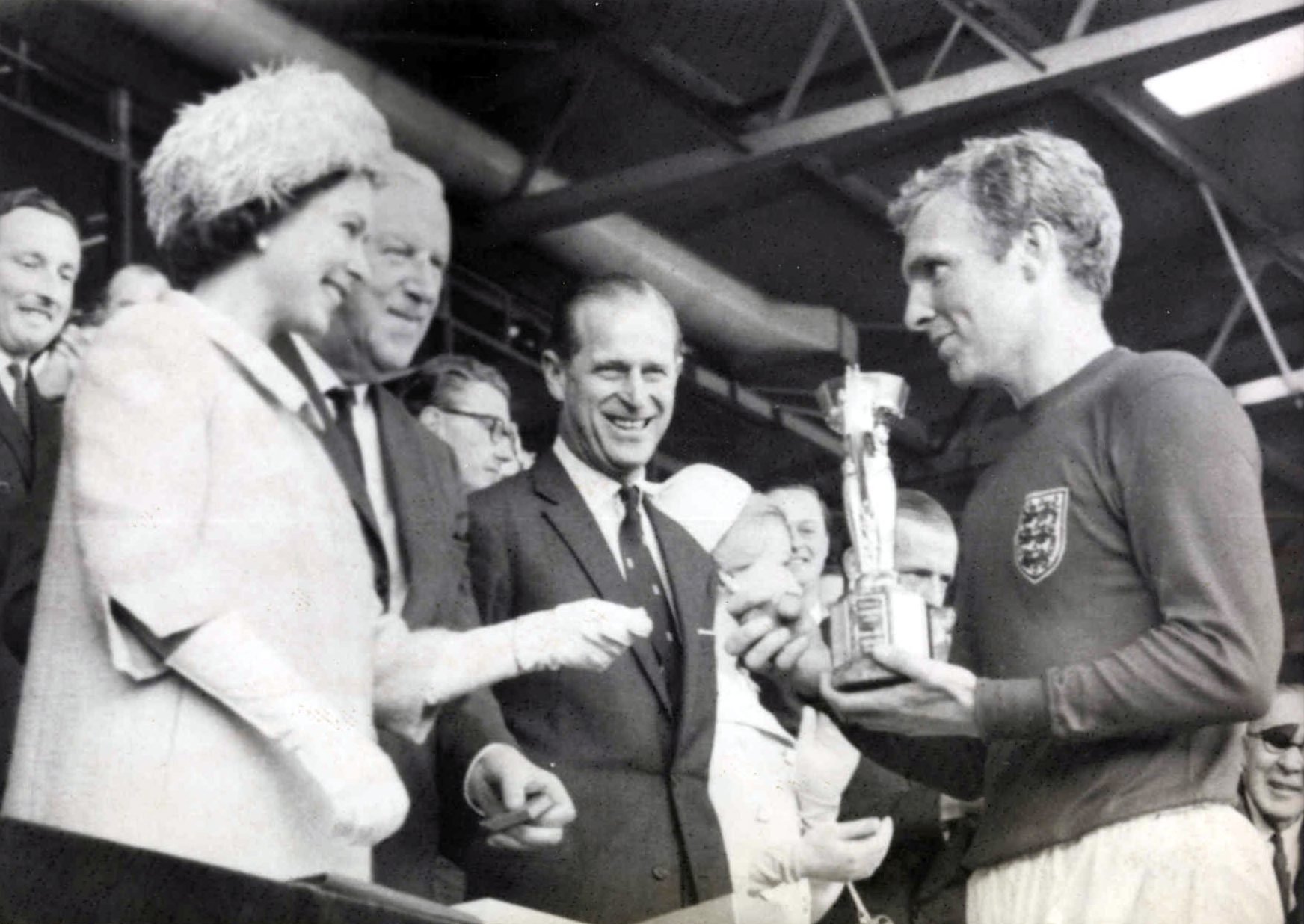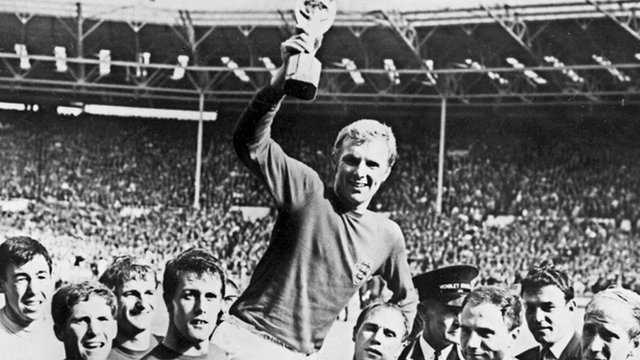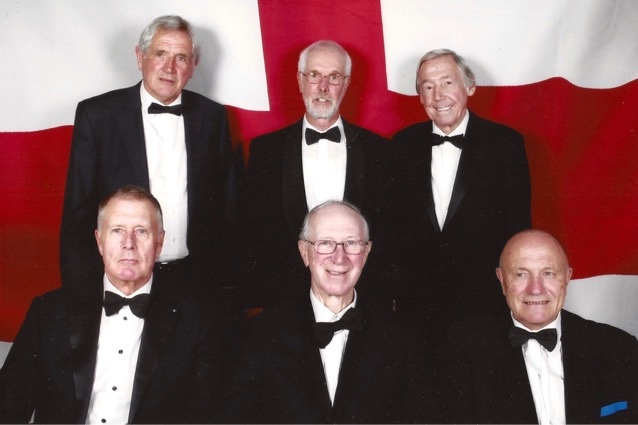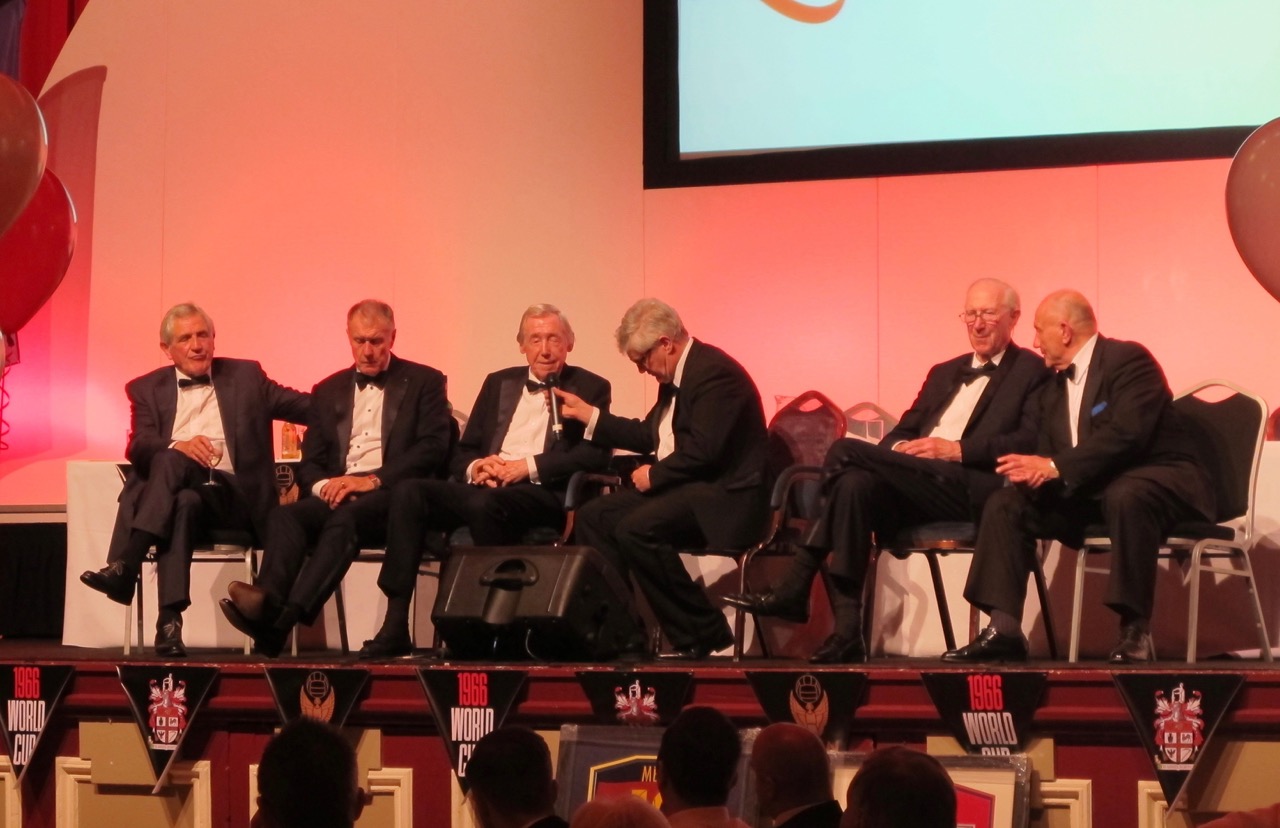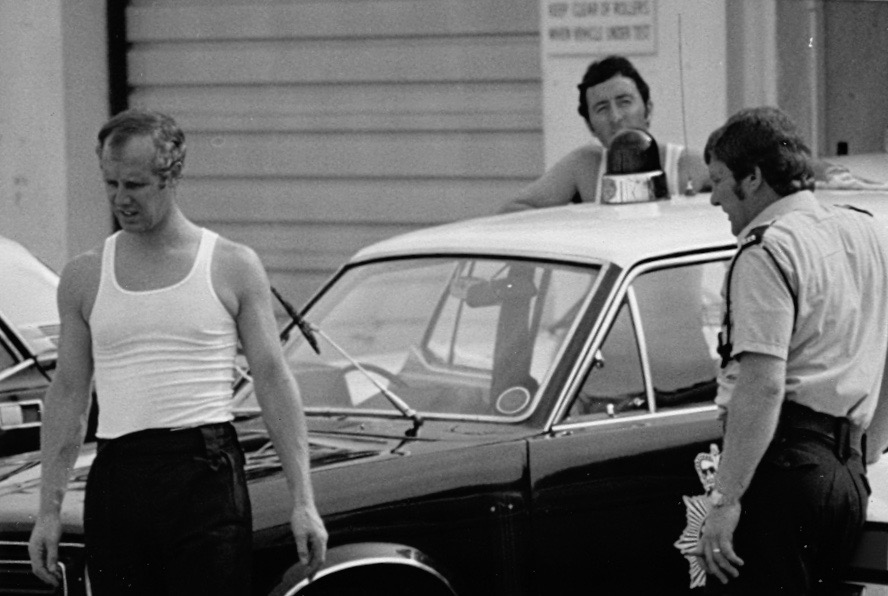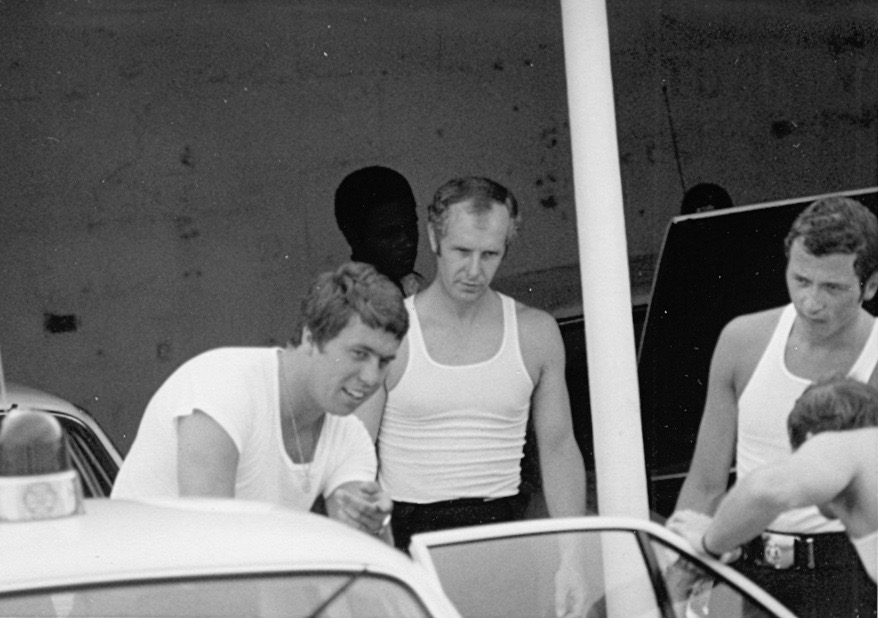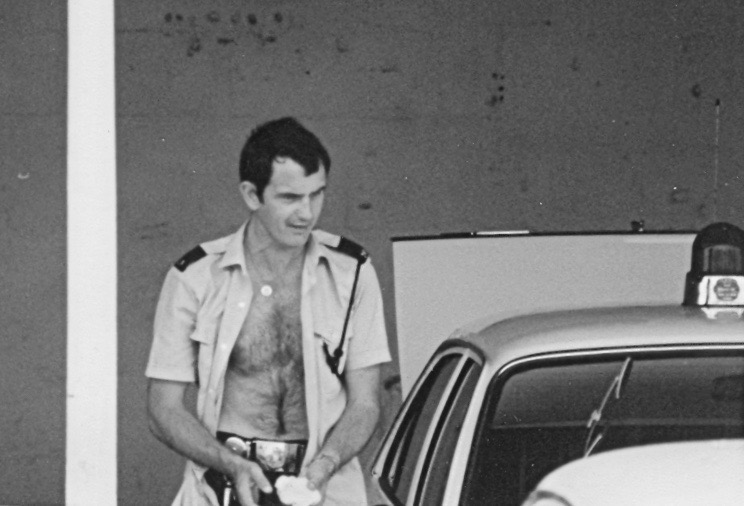Submitted by
Charlie Mooney
A long time ago, in a far off distant land, known as The Isles of Devils, there existed a ‘Watch’, also referred to as a ‘Shift’ in some jurisdictions, simply named ‘B’ Watch. There were many wise men who opined on the derivation of this tag ‘B’, since there were so many possibilities in the dictionary, and in particular, on the personnel who worked Island-wide within this unit.
The positivity of the pronouncements depended largely on whether or not you wished to be dealt with by them, or whether you really wanted them not to be dealing with you. For it was known that there was no finer group of men within the Bermuda Police Force in the 1970s. They all worked very hard together but they also played very hard together when not working and this included their families.
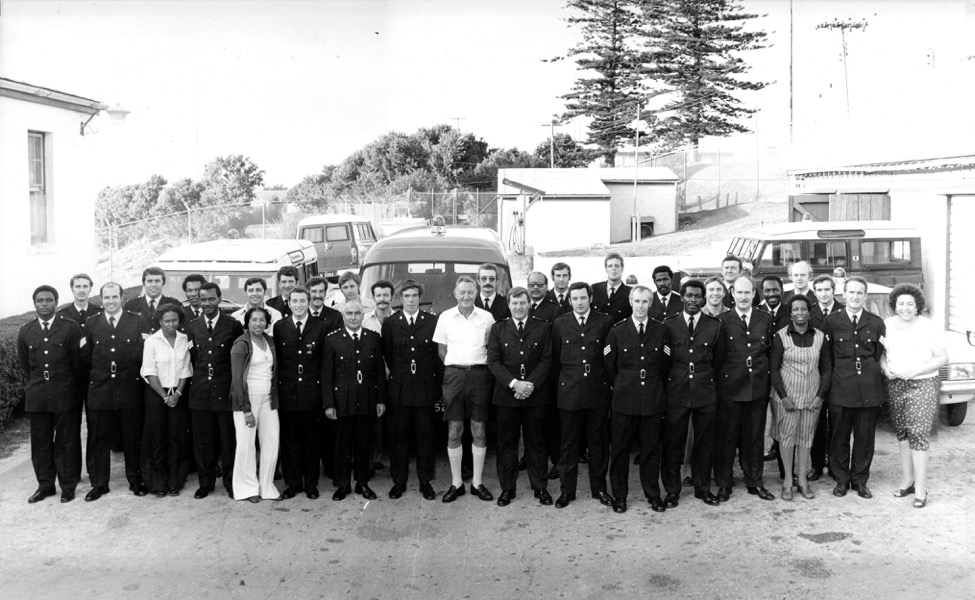
Traffic Division taken in November 1978.
Back Row (l-R)Anthony Taylor, Roger Brydon, Hiram Edwards, John Instone, George Rushe, David O’Meara, John Baxter, Nicky Bolton, Charlie
Mooney, Mike Phillips , Barry Higham, DaveSmith, Laurie Phillips, Pater Walgate, Gordon Farquhuar, Gary Murrell, Frank Wood, Lyndon Lewis.
Front Row (l-r) Dennis Gordon, John Graham, Brenda Lewis, Orson Daisley, Dee Tavares,Roger Beschizza, Chief Inspector Ernie Moniz, Inspector
Robin Henagulph,Inspector Arthur Rose, Andy Hall, Stephen Peterson, Roger Sherratt, Archie Husbands,
Roger Kendall, Esther Smith, Mike Burke, Carol Royer.
How many of these officers were members of "B" Watch?!
They operated by what many other Police officers saw as unorthodox, but always legal means, even if their methods were not taught in the Training School, or always permitted by Senior officers.
On one occasion, when there was a report of a prowler outside a woman’s house in Spanish Point, the first vehicle to go 10-8 (“have arrived’) at the scene, within minutes, was the St. George’s local vehicle, which should not have been on this side of the Causeway! Lenny Creighton and Stuart Kirkpatrick were in the vehicle that night and their ‘defence’ was “We were on our way to Operations for gas, Sarge!”
Police Constable 214 Andrew (Andy) Comrie Hall fitted extremely well into this close-knit band of men. He always said that his father meant to call him Crombie, but was still celebrating his birth and spelt his middle name incorrectly at the Registry office.
Although both Andy and myself were born and raised in Glasgow, Scotland, we were from opposite sides of the Great Football Divide. Andy was a Rangers supporter and I was a supporter of their great rivals Celtic. We always had a bet on the game each time they played against each other. It was a standing bet, even if neither of us was in Bermuda. It was just expected that we had a bet on the game which was usually $10. We bet against each other many other times as our way of settling a dispute or difference of opinion.
In those days it was quite common for ‘B’ Watch personnel to attend at the R.A.F.A. Club in the morning at the end of a week of nights. This stay usually lasted until just before midday when we would make our way to the PRC. When it closed at 2.30pm it was time to attend for dominoes and/or cards at the Mariners’ Club.
One day Andy and I got into an argument about some rule in football, ‘soccer’ as it is sometimes called. We were unable to resolve it there and then despite the input from our other assembled football ‘experts.’ However, one of them did suggest a solution as to which one of us knew the most about the Rules of Football. The Bermuda Football Referees Association was holding its annual Rules Examination that evening at the National Stadium. The only problem was that it started at 5.30pm. We therefore had to go straight from the Mariners’ Club to the National Stadium.
We both passed the written exam and they then announced that we had to go straight to Police Field for the second part. You can imagine our surprise when they told us it was a physical exam! We had to run laps around the field and then run sprint shuttles. This was after our busy day in the aforementioned establishments! I do remember that I beat Andy but I can’t remember what my prize was.
Perhaps one of the strangest bets that Andy and I had was made another morning in the R.A.F.A. Club. Andy said that I could not eat a dozen hard boiled eggs without a drink. After some negotiations I was permitted to use as much Mayonaise as I wished. The event was scheduled for the next Monday morning after our Night shift in the same venue. The bet on this occasion was a case of beer. I had to provide the Mayonaise and Andy would provide the eggs.
I didn’t give it any further thoughts until the big morning arrived. We gathered at the R.A.F.A. Club and after a couple of beers I was ready to face the challenge. I had my large bottle of Mayonaise. Andy then produced his masterstroke! He had bought a dozen Jumbo sized eggs! That’s when it dawned on me that we had not even discussed the size of the eggs. I did manage to struggle through the whole dozen eggs to claim my case of beer.
‘B’ Watch played cards at any opportunity, whether it was a get-together on our days off, or during our refreshments (refs) breaks on nights. In those days the Traffic patrols took their refs from 4.00am until 6.00am. Most incidents occurring during these times would be dealt with by the Divisions. However, not all. If an alarm went off, or there was an urgent call then the whole of Traffic attended and it was like a race to be first on the scene, irrespective of which area you had been assigned to.
It was during one of these card games, we always played our own version of ‘Trumps,’ that a call came in to the Operations Centre where we were playing at about 5.10am. Andy, as Duty Officer, answered. It was from a woman on Harbour Road, Warwick, reporting that there was a man at Darrell’s Wharf acting suspiciously. He was apparently walking around and not staying still, whilst glancing out towards the harbor and up and down Harbour Road.
Attending this incident would have resulted in the card school being disbanded. Andy must have had a good hand and been in line to win the $1.00 per person stake, because he had a brilliant idea. He knew that there was a public telephone in the shelter at Darrell’s Wharf, so he suggested looking up the number and calling it. He duly got the number, dialed it and the man answered. He was put onto the speaker so that we could all listen.
Andy explained that he was calling from Police Headquarters and since we were carrying out observations in the area, we had noticed that he had been hanging about for the last ten minutes or so, was there any particular reason why he was there? The man replied that he was waiting for his friend to pick him up in his boat so that they could go fishing. He was supposed to be picked up at 6.00am. Andy then asked him if he could leave the area until closer to 6.00am and then come back. The man agreed to this request and hung up.
Andy waited a minute and then called back the woman who had called in the report. He asked her if the man was still there and received the response that the strangest thing had happened. Shortly after she had called, the man used the phone in the shelter and then left the area. Andy replied that we had sent an unmarked car through the area to check it out and it was all clear. The woman had seen a car on the road. We were then able to resume and complete our card game. Another report resolved in a manner that is not taught in any Police Training Manual.
Editors note - The photograph of Traffic Department above was taken in 1978, and we wonder how many of them were members of "B" Watch. I had the privilege of being the Sergeant in charge of "B" Watch for several years and I can say without hesitation that it was the finest group of police officers I ever worked with. As Charlie says above, they played hard but they also worked very hard, and could always be counted on to deal with difficult situations.
Just one brief story I can recall about "B" Watch. We had been working on Late Shift 4pm-12 pm and on this particular evening the Police Club had a special on for some new brand of beer. It was either free or being sold at a ridiculously low price just for that one evening. As soon as they knocked off work all the members of my Watch scampered up to the Club for the cheap beer - all except two, myself and one P.C. who I believe was either Roger Brydon or Barry Higham. We were dealing with an accident and didn't get off duty until after 12.30am and the bar was closing at 1am. All our "B" Watch lads had consumed ast least 5 or 6 beers by the time we arrived, but by 1am my partner had caught up with them on at least 8 or 9. I have to admit that I was almost a non-drinker and only managed one - a very poor effort by "B" Watch standards!
Without going through the list in great details I remember the following members of "B" Watch during my time:- Andy Hall, Barry Higham, Steve Peterson, Tony Laughton, Roger Brydon, Bruce Bingley, Dennis Gordon, Archie Husbands, Charlie Mooney, Roger Beschizza, Lyndon Lewis, the irrepressible George Rushe, Dave "Pointed Stick" O'Meara, and John Baxter to name some of them.
If you served on "B" Watch please feel free to send us any photos you have, and your recollections of your time with the lads. Here's a few photos to start off the collection. Anyone who worked in Traffic will recall that we always had to wash and clean our patrol cars on Sunday morning's - or incurr the wrath of Chief Inspector Ernie Moniz!
Sunday morning car washing on "B" Watch
Roger Sherratt, Ray Bell and Andy Hall
Roger Brydon, Roger Sherratt and Roger Beschizza
Bruce Bingley
7th April 2016
Charlie Mooney provided the following additional details about "B" Watch in Traffic and around the island:-
In addition to the persons listed, some of the other notables on 'B' Watch Traffic included:
Gerry James, Orson Daisley and I think Eddie Foggo may have been before Gerry.
There was also Ray Bell, Roger Beschizza, Lyndon Lewis, Anthony 'Tinker' Taylor, Gary Murrell, George Rushe.
We didn't really have much movement from 'B' Watch over the mid to late 70s.
In St. Geoge's we had Brian Flook, John Morris, Lenny Creighton, Donald Grant, Dave Shakeshaft, Stuart Kirkpatrick, and Pete Shaw.
Somerset had John 'Coco' Eve, Gerry Lyons, Andy Donaldson, who locked up Somerset station one night to attend a 10-55 at Crockwell's on Middle Road, Warwick in a Kombi!
I can only remember Brian Malpas, Mincy Rawlins, Coghlan 'Coggie' Gibbons and Jonathan Smith in Hamilton.
FYI - Today is National Beer Day. Should be at PRC this afternoon with the other retirees in our corner!!!!

